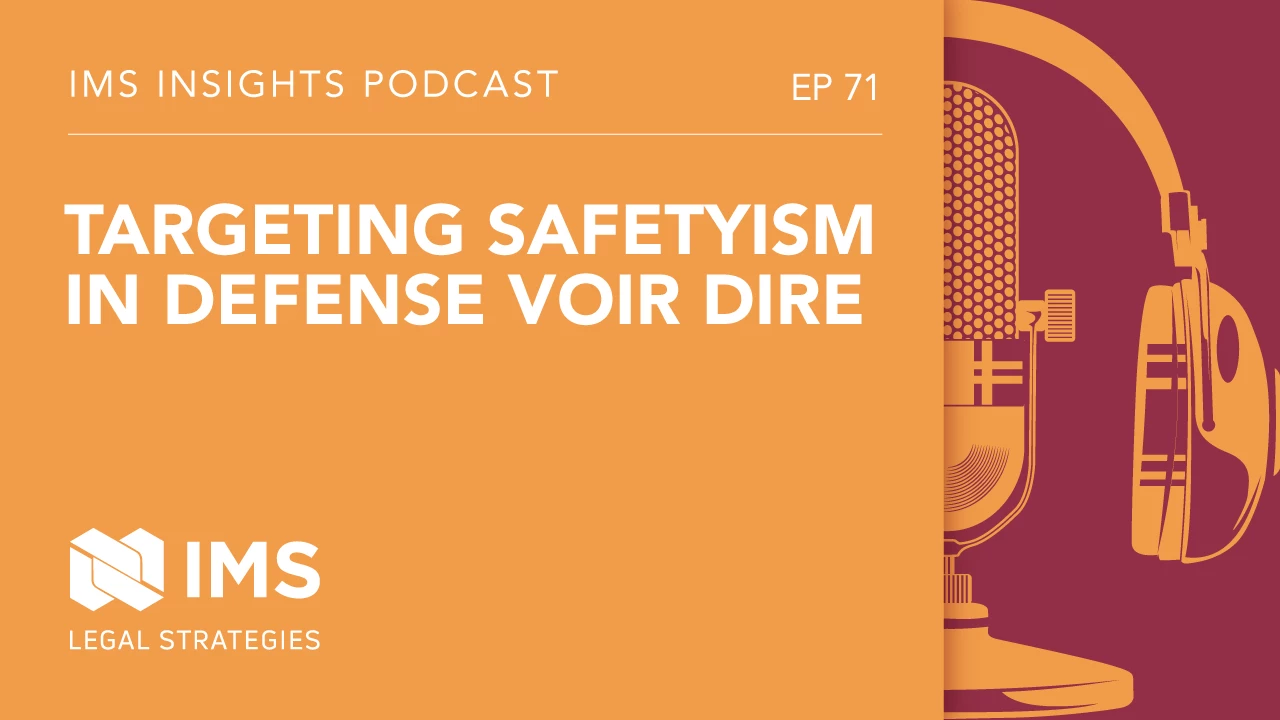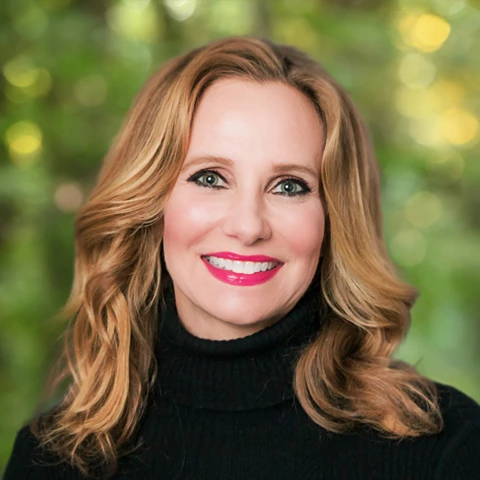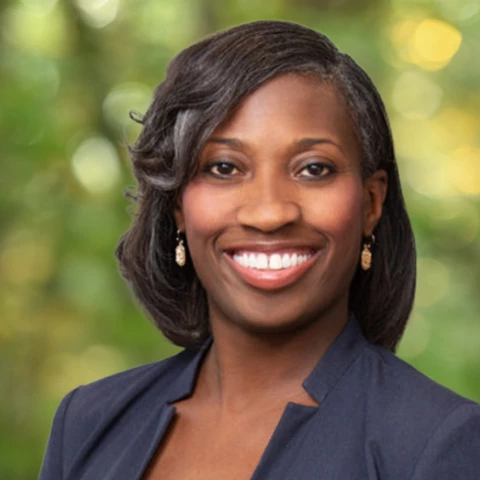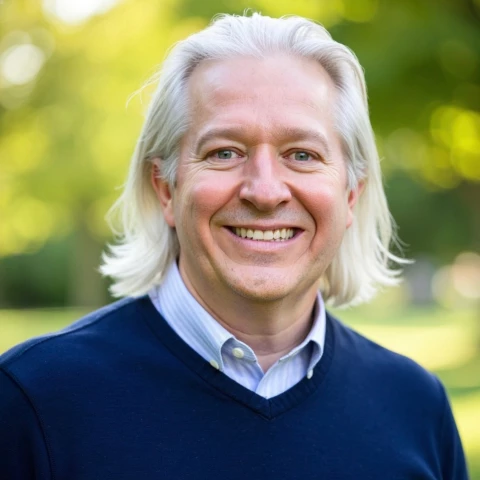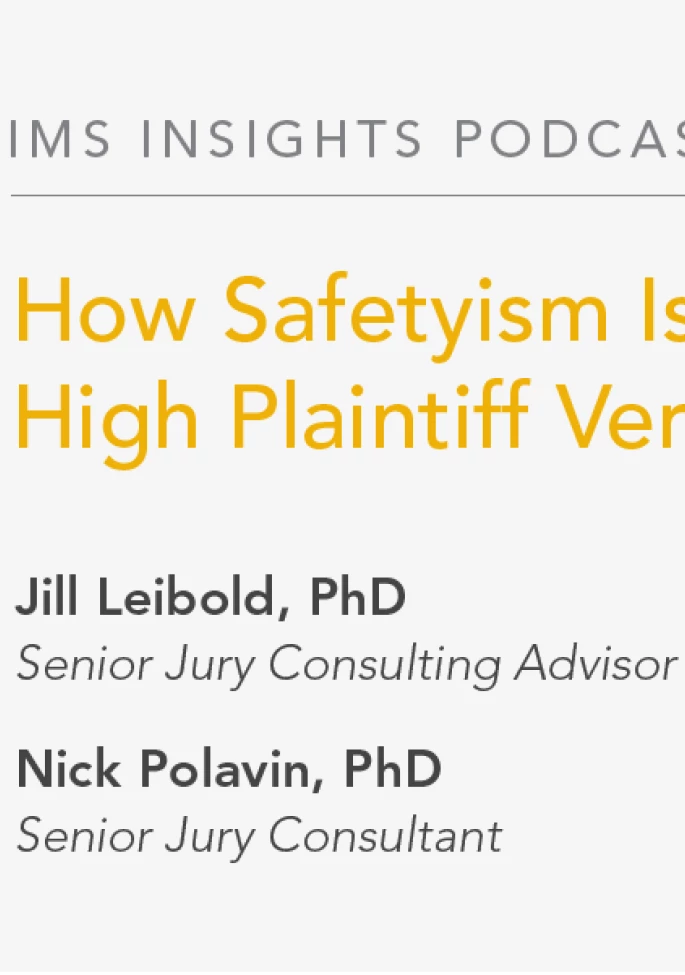Explore the impact of safetyism on high jury verdicts and learn how corporate defense teams can effectively navigate this evolving mindset in the courtroom. In this episode, host Adam Bloomberg speaks with IMS Senior Jury Consulting Advisor Dr. Jill Leibold, Senior Jury Consultant Dr. Nick Polavin, and Thompson Coe Partner Zandra Foley, who share expert strategies for identifying and addressing jurors' hyper-protective attitudes during voir dire.
Hello, and welcome to the IMS Insights Podcast. I'm your host, Adam Bloomberg. Joining me today are IMS Senior Jury Consulting Advisor Dr. Jill Leibold, Senior Jury Consultant Dr. Nick Polavin, and Thompson Coe partner Zandra Foley.
In this episode, our guests will explore how a winning defense strategy begins with a targeted voir dire to identify jurors with strong safetyism attitudes. By staying one step ahead of these evolving beliefs, defense counsel can lay the groundwork for courtroom success. If you enjoy our content, please like and subscribe to our channel.
Adam Bloomberg: Welcome, everyone. Nick, you and Jill have really pioneered this concept of safetyism in litigation and its effects on jurors and decision-making. Now, in previous podcasts and articles, you've addressed the discreet issues as to how it applies to jurors. Why don’t you start us off with a brief description of what safetyism is?
Nick Polavin, PhD: Safetyism is a hyper-protective mindset where more and more people think that that things need to be 100% safe 100% of the time, whether it's the product, a procedure, property. And this has developed over the last, you know, five to seven decades is what the research has shown, where, you know, we used to face risk a lot more often than we do today. But now because we aren't facing risks as often, we're not very comfortable with it. And we've also been conditioned to be paying attention to fearful things, you know, thinking back to stranger danger and missing children on milk cartoons.
And then fast forward to the 24-hour cable news cycle where they have to fill 24 hours of news. And so you know, we tend to pay attention to things that we're fearful of that are negative. And so quite often, they fill that with crime and other things that make people scared. And then, you know, in the last decade, we've had, you know, safe spaces and cancel culture where not only people are avoiding physical risks, but emotional risks as well. You know, people not being comfortable with hearing ideas or perspectives that are different than theirs. And this really, it comes down to three thought fallacies, which I'll just preview now. It's risk aversion, emotional thinking, and tribalism. But if you want to read or hear more about those, you can check out the IMS website. We have a few podcast episodes and a few articles on those thought fallacies.
Adam Bloomberg: Zandra, you're a well-known litigator in Texas with recent defense victories and a few in venues outside the state—you’ve seen this firsthand. How about some insights on recent cases with these extraordinarily high verdicts?
Zandra Foley: It's interesting because according to the National Law Journal's pre-COVID top 100 verdicts list, the top verdict during that time frame is around 64 million. Fast forward to 2023, the top verdict was 1.2 billion. And across the board, all verdicts were up. And specifically, Texas was one of the places where they had a lot of the highest verdicts.
An example of one of those types of cases is the Lacks Beach Service case. This is a 2022 trial that involved, it was a wrongful death lawsuit against the company that sold beach equipment. And even though it was a public beach, the plaintiff's counsel was very, was able to successfully kind of use the whole profits over people type of line in order to get a very, very large verdict. And it just so happened that, you know, the facts came into play to where they could support that, because sometimes people will try to use a line like that, but if the facts don't really lend themselves to it, it doesn't really work. In this particular case, it did because the company just won this contract to provide, to be able to sell items such as sunglasses and umbrellas on the beach. And the argument during the trial was that that's what they were focused on. That company was more focused on trying to sell products as opposed to saving lives. And so, when this child was out in the ocean and drowned, there was nobody there to save them. And as a result of that, the verdict was over 20 million dollars. And so, so that was one case.
There was another case in Texas that got a lot of press, and that was the Cruz v. Allied Aviation Fueling Company. And I was able to actually watch a little bit of this trial because it was actually live-streamed. And this involved a gentleman who was hit by a bus or a van at an airport. There was video, which I think also anytime you have video evidence, it's also going to increase the value of the case. But it really was just a, a car accident at the very, at the very, you know, basic description of it. But because of the arguments and themes that the plaintiff's lawyer was able to implant and say over and over again in front of the jury about the fact that you have to keep people safe and just all these safeties and themes that that verdict was over 300 million dollars.
Adam Bloomberg: Jill, let’s talk about some of your recent cases. How is the safetyism mindset presented in jury pools?
Jill Leibold, PhD: We're seeing this in our mock trials and focus groups as well as in juror responses to courtroom jury questionnaires and in voir dire. And we're hearing things from them such as, you know, a manufacturer should never put a product out unless it can be proven 100% safe, 100% of the time. We're hearing things like a distrust and disappointment of government agencies such as the EPA, FDA to keep people safe. And that was a particular, you know, that sentiment has definitely been growing over the past 10 years, but with all of those agencies in the forefront during the pandemic, it really created a trigger event for people's views and attitudes toward those agencies and the feeling that they just can't keep up enough to keep people safe. And that is a lot of what we're talking about here are people are making these decisions and saying these things based on their feelings. So, a lot of emotional thinking is driving those kinds of attitudes. The problem with that that we're seeing is that there's no situation where a corporate defendant can prove that they've done, and don't need to also, but that they've done everything 100% right, 100% of the time. And jurors are using that, you know, hindsight bias to go back to, "Well, you didn't have proper warnings in 1972 when, you know, this plaintiff was exposed to what have you." Right? And so, they're especially pointing to warnings.
And we see that very much with the safetyist attitudes and Nick and my research on what's driving jurors' sense of safety. And the warnings are one of the biggest hurdles that we're now seeing with corporate defense cases because jurors really want every warning out there so that it's the consumers' choice whether they read it or follow it, but as long as they know. And it's that lack of information that they get angry about. And that's where we're seeing a lot of the damages being driven up higher. And so, but we're seeing that in both the courtroom and in our jury research. So it's definitely ingrained, and it's been building for quite some time.
Nick Polavin, PhD: And just to add on to what Jill talked about, the other areas that we've seen safetyist jurors really get upset is cases to do with testing or training where the plaintiff is alleging, you know, they should have done more, more testing, more training. And that's, you know, these jurors who have this fearful mindset where they're, they're expecting 100% safe 100% of the time, can really find for the plaintiff quickly and want to award high damages from those facts as well.
Zandra Foley: I was involved in a recent case actually, a trial where part of the issue was a product liability claim. And one of the questions related to testing. I think testing is another area, you know, as you pointed out, is that safety jurors are very, very focused on. And even in that case, even though there was evidence presented of thousands of testing and tests that were run on this particular product, the plaintiff's counsel was able to point to one particular test that quite frankly, didn't have anything, or didn’t have a whole lot to do with what happened in the lawsuit, but they pointed it out that the defendant did not do that particular test. And we believe that that's what led to the finding of a defect on the verdict form. And so, you know, this is a place that we see these types of jurors. They’re very, very focused on, you know, typically they’re going to find in favor of the plaintiffs on these cases.
Adam Bloomberg: Okay, Nick, what can you tell us about conspiracy-minded jurors?
Nick Polavin, PhD: Conspiracy-minded jurors are a new group of jurors who we’re looking to identify in voir dire. They're different from safetyist jurors and so that presents a challenge that you're not just looking for, you know, the worst type of jurors, you're looking for different types of jurors who tend to be plaintiff-leaning. One thing that they have in common with safety as jurors is that they make decisions based on their emotions, based on their gut feeling, but they're completely different in that they don't tend to have the same levels of risk aversion as the safetyist jurors. But what they do have is very anti-corporate sentiments. They tend to look at, you know, the little guy versus the corporation, and the corporation is covering something up, they're cutting corners, putting profits over people. And so they are also on this search for justice, but they're going in a different way to get there because they're so anti-corporate and because they really want to exert their power over a corporation. And so, and I should mention what it ends up coming down to on the political spectrum is the safetyist, the strong safetyist jurors are far left-wing jurors, and the strong conspiracy-minded jurors are far right-wing jurors.
Adam Bloomberg: Zandra, I'm going to bring it back to you here. Based on all of this, what do you think the best approach is for a corporation that wants to defend itself from these huge verdicts?
Zandra Foley: Well, yeah, I think the first approach is to know who your who your opponent is. There are a lot of very skilled plaintiffs' attorneys out there who know exactly how to implant those seeds into the venire panel's minds at the very start of the trial. And so if you know that that's coming, one of the things that you can do is to make objections when those issues are brought up.
So, one of those big issues is the burden of proof. That is typically the first place that appliance counsel is going to go to try and interject those ideas. And specifically, what we typically see is the whole scales, you know, it's if I have 1% more than you or if I have one sheet of paper more than the defense, then that means we win.
And I have had an experience with Jill where we were selecting a jury in Houston, TX, where once the plaintiff's counsel got a good look at this jury panel and saw that it was probably not a lot of people on there who were jurors that he wanted on the case, he immediately starts asking this question. And when jurors were voicing their opinion that, you know, they don't think it should just be one piece of paper or one little feather that, you know that it should be more than that, they kind of used that and just ran down the list of people. And this was an extra-large panel. I think there was about 130 venire men and women who were who were there. And he just ran down the panel such that I didn't even get to do a voir dire in that case, because the court recognized that he had knocked out so many people for cause who said they could not agree to the burden of proof. And so essentially, he equated this one sheet of paper, one feather, to the legal description of the burden of proof. And I think one way to prevent that is to a motion and limiting objections, trying to head it off before you even let it get started, because once it catches, it catches like wildfire.
Jill Leibold, PhD: I'll just interject a little. And what that essentially did was identify and remove our non-safetyist jurors because they were focused on the evidence, they wanted proof, and they weren't going to buy into making those decisions with their feelings, which is exactly what the plaintiff's attorney was trying to get to. And with the course of that particular case, really rely on their emotional decision-making. And so he got rid of everyone who wasn't willing to use their gut on the verdict form.
Adam Bloomberg: So Jill, what sort of approach do you advise to weed out these sorts of jurors?
Jill Leibold, PhD: Well, we have a lot of different ways to go about that, both in terms of what Zandra just mentioned, setting the stage before the voir dire even begins. And another way that we set the stage before voir dire, is if we have the jury list ahead of time. For example, in that particular case, we had the jury list the day before, and we were able to do social networking searches on the jurors. And that can provide us with a huge amount of information at times because we can find out if jurors are posting very emotional things. They always feel victimized if they're ‘pull yourself up by the bootstraps’ type of a person or if they're a conspiracy theorist. If they're reposting conspiracies and we find that they're on the far-right end of the spectrum, that tells us a lot, too.
And so having that information ahead of time will help us create basically a subset, a list of the names that we want to target in that voir dire. And this is particularly important if we have a limited amount of time by the court to actually talk to the jurors. So for the jurors that we know are potentially decent for us, we're not going to spend much time with them, but if we find with that research that we've done that there are some jurors that we really need to focus on for, potentially cause, and at the very least our peremptory strikes to really get that information from them. And so coming armed with as much information as possible is really critical.
And then understanding who those safetyist jurors are, you know, knowing that our priority strikes are people who will not take risk and they think that nobody should be accepting risk. And that goes for physical such as, you know, cancer or what have you, but also emotional risk because those are the ones who are the most susceptible to emotional thinking. And therefore, the pain and suffering damages things like that where that that's where we're seeing some of those really high verdicts. And so coming armed, knowing what we're looking for and targeting those specific people, hopefully for cause, right. And getting them to repeat in their own words, you know, that this, these are strongly held beliefs, that they've held them for a long time, that they would not necessarily trust the results of corporate product testing, for example, because the corporation paid for it. And, you know, and they would never trust or believe that it was safe.
Adam Bloomberg: Well, let's dig a little deeper into those conspiracy theorists and their strongly held beliefs. What are you looking for with them?
Jill Leibold, PhD: Distrust in government agencies. So, and to Nick's point about the conspiracy jurors, they are different from the safetyism jurors in their views on government agencies, and for safetyist jurors, they are distrustful of government agencies to keep people safe. It's very specific. They think the agencies are overwhelmed. They think that there is a little bit of back and forth with corporations giving them a little bit of leeway, but more than anything, they think that they're just understaffed, underpowered, and they can't do what they need to do to keep people safe versus the conspiracy theorists who think that governments and corporations are all just big conspiracy factories and just hate the entities as a whole. And so we can distinguish between them in voir dire based on that. You can certainly ask about anti-corporate views, anti-government views as a whole to identify those conspiracy jurors, but then also government-specific government agencies to keep people safe.
Adam Bloomberg: Nick, along those lines, how can you definitively identify jurors who lack trust in some government agencies and as an important identifier for a safetyist attitude?
Nick Polavin, PhD: So this one I think is important because a lot of people here, well, people who don't trust the government agencies. So, you know, some people will ask who has a negative opinion of FDA or EPA, but the problem with that is that jurors don't really answer that question. They don't tend to raise their hand on that question because they tend to think, I mean, for one reason or another. Well, I don't know if I have this negative feeling, and I certainly don't want to participate in this process, but you need to ask for more targeted beliefs.
And so Jill went into the ways you can find a safetyist juror versus a conspiracy juror. So the safetyist juror, you can ask who believes that the EPA is underfunded or who believes the EPA is understaffed, or you know, to keep Americans safe, who believes the EPA needs more funding? Similar questions with the FDA. But then to find the conspiracy-minded jurors, asking who believes that corporations manipulate the FDA to reach conclusions that are business-friendly, or you know who, who believes that That corporate or that the EPA just bows to the power of corporations so that they can continue to make a profit, so that gets at that conspiracy mindset. And when you ask about specific beliefs like that, that triggers something in a juror to think, you know, I might not have this negative opinion, but I do believe that. And so you tend to get more hand raises when you're asking those specific beliefs.
Adam Bloomberg: Jill, if you're going to go for a cause challenge, you know, you obviously first have to get the jurors to speak openly about their views. What do you advise defense counsel to do to get that potential juror to open up and share those beliefs?
Jill Leibold, PhD: One effective way I've seen is to disarm the jurors early on, even just as a whole panel, before targeting individual jurors. Basically, letting them know that you really need them to tell you what they really think and that you have a very thick skin. You've heard it before. It's not going to hurt your feelings, but it's critical to understand what you really think. And so please just feel free to give it to me, you know, as hard as harsh as you might think it is. And that actually works. It breaks down those barriers of social politeness that sometimes jurors may feel coming into a strange situation with a courtroom full of strangers. And it at least gives them the permission to say potentially mean things about your client.
Adam Bloomberg: Zandra, do you have any examples of a time you've used targeted cause sequencing on a bad juror and succeeded?
Zandra Foley: So, I'm thinking back to a case I had about a year ago, and the plaintiff's attorney did something that I'd never really seen before. She started out by asking a general question to the panel about what is important in your what's important to you, what's important in your life? And as you can imagine, each of the venire people would go by, and they'd say my family or this charity. And then kind of after she got everybody whipped up into that, then she started talking about justice and what does justice look like? Kind of using the facts of our case a little bit. And, of course, a lot of what you heard was trying to make sure that if a person does wrong, that they pay for it and that kind of general sentiments. And so whenever it was my turn to get up and question the jury, I basically kind of used her general theme of justice and then just posed the question, “Well, if someone was accused of something and they did not do it, what does justice look like in that scenario?” And I just kind of gave, based on some of the responses that they gave, scenarios where I kind of turned it around a little bit. And I do think that that was effective because this was another case where this was our second voir dire.
The first voir dire, she did the exact same thing, and it knocked out a lot of the panel members because they said they could never believe that, you know, they couldn't essentially be able to rule in favor of my client because she had pushed them that far. So the second voir dire she came and she did the exact same thing. I kind of turned it around this way and got, you know, some of the people who normally would have gotten probably not or struck for cause in that situation because of some of the responses they were giving. I was able to rehabilitate some. And then also because of that, we were able to pick a jury, and we ended up getting a defense verdict in that case. So I think that was just another way to kind of just, you can use some of what they do and turn it around in order to kind of “uncondition the conditioning” that the that the plaintiff's lawyer attempts to do.
Jill Leibold, PhD: Yeah. And I love, I love taking control, the idea of taking control of the word justice because it's not just for plaintiffs.
Zandra Foley: Right.
Jill Leibold, PhD: And we have our own version of it. And that's why we're here in court before you today because we were accused of something we didn't do. And I think that is so smart and effective to turn that around on them when they try to use that.
Zandra Foley: And that's a great argument that I'm going to steal from you.
Adam Bloomberg: Well, Zandra, Jill, and Nick, thank you so much for your time today. It was a real pleasure, thank you.
Thank you to Zandra, Nick, and Jill for speaking with us today, and a special thanks to our listeners. Please join us next time and subscribe to the IMS Insights podcast.
IMS has delivered strategic litigation consulting and expert witness services to leading global law firms and Fortune 500 companies for more than 30 years, in more than 45,000 cases. IMS consultants become an extension of your legal team from pre-suit investigation services to discovery and then on to arbitration and trial. Learn more at imslegal.com.
Episode Guests:
-

Jill M. Leibold, PhD
Senior Jury Consulting Advisor
-

Nick Polavin, PhD
Senior Jury Consultant Affiliate
-

Zandra E. Foley
Partner at Thompson Coe
Episode Hosts:
-

Adam Bloomberg
Senior Client Success Advisor
Related Industry Insights
-

11.04.24
Article |
Related Industry Insights
A New Focus for Defense Voir Dire: Safetyism
-

11.16.23
Podcast |
Related Industry Insights
How Safetyism Is Driving High Plaintiff Verdicts | Episode 68
-

10.09.23

IMS partners with the most influential global law firms and corporations to elevate their legal strategies. Our trusted expertise is hard-earned. Together, we win.



